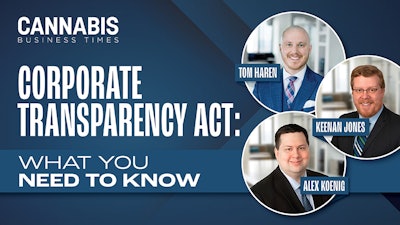
Editor's and authors' note (added Nov. 20, 2024, 9 a.m.): All cannabis companies, both plant-touching and ancillary businesses, are required to report beneficial ownership information to the U.S. Treasury Department’s Financial Crimes Enforcement Network (FinCEN), unless the business qualifies as exempt (as explained below).
The Corporate Transparency Act (CTA), initially enacted on Jan. 1, 2021, requires certain companies to report beneficial ownership information to the U.S. Treasury Department’s Financial Crimes Enforcement Network (FinCEN). FinCEN established Final Rules regarding the CTA, and it formally came into effect on Jan. 1, 2024, causing confusion and headaches for business owners across the country as they grappled with compliance under new rules and regulations. FinCEN estimates that 32.6 million companies formed prior to Jan. 1, 2024, will need to register with FinCEN and provide certain beneficial ownership information in an initial report by the end of 2024, with up to five million additional initial reports for companies formed after Jan. 1, 2024, to be filed on an ongoing basis. Failure to do so will potentially subject these companies to civil—and even criminal—penalties.
A “reporting company” under the CTA includes corporations, limited liability companies, limited partnerships, limited liability partnerships and any other entities created by filing a document with the secretary of state (or similar office) of any state in the United States. Unless an exemption applies, reporting companies are required to file an initial report containing the following information to FinCEN: (1) name of the company, including any trade name or “doing business as” name registered with any secretary of state (or similar office); (2) business street address; (3) state of formation; (4) IRS Taxpayer Identification Number; (5) information regarding the beneficial owner(s) of the company (more on how FinCEN defines this later); and (6) information regarding the “company applicant”, if formed after Jan. 1, 2024.
Although there are 23 exceptions to the CTA, very few of them are likely to apply to reporting companies in the cannabis industry. Two exemptions of particular note for those in the cannabis industry are the “inactive entity” exemption and the “large operating company” exemption.
Under the inactive entity exemption, even entities that have remained inactive for a number of years may fall under the purview of the CTA, as the CTA imposes strict qualifications to qualify. Inactive entities are entities that (1) existed on or before Jan. 1, 2020; (2) are not engaged in active business; (3) are not wholly owned, directly or indirectly, by a foreign person; (4) have not experienced a change of ownership in the preceding twelve months; (5) have not sent or received more than $1,000 in the preceding twelve months; and (6) do not otherwise hold any type of asset, including ownership interest in another entity.
On the other end of the spectrum, the “large operating company exemption” requires a company to meet each of the following criteria to receive an exemption: (a) employ more than 20 full-time employees in the United States; (b) have an operating presence at a physical office within the United States; and (c) have filed a federal income tax return for the previous year demonstrating more than $5,000,000 in gross receipts or sales on the company’s IRS Form 1120, IRS Form 1065, or other applicable IRS form.
Each criterion involves an intricate analysis, and potential pitfalls must be avoided—what constitutes a full-time employee? What does it mean to have an operating presence? These questions, and many more, must be thoroughly examined before concluding that an entity qualifies for the large operating company exemption.
Here are detailed answers to seven of the most important questions cannabis owners need to be asking about the CTA:
1. When is the deadline for filing an initial report of beneficial ownership information under the CTA?
For entities formed prior to Jan. 1, 2024. the deadline to file the initial report is Jan. 1, 2025. The report is required to include information about the reporting company and its beneficial owners.
For entities formed after Jan. 1, 2024, but before Jan.1, 2025, the deadline is 90 days after the entity was formed. The report is required to include information about the reporting company, its beneficial owners, and its company applicant.
For entities formed after Jan.1, 2025, the deadline is 30 days after the entity was formed. The report is required to include information about the reporting company, its beneficial owners, and its company applicant.
2. Who is a “beneficial owner” under the CTA?
A beneficial owner is any individual who, directly or indirectly, either:
· Exercises substantial control over a reporting company; or
· Owns or controls at least 25% of the ownership interests of a reporting company.
Exceptions to being qualified as a beneficial owner:
· Minor children
· Nominees, intermediaries, custodians, and agents
· Employees (if certain, additional exceptions apply, more details available here)
· Inheritors (if certain, additional exceptions apply)
· Creditors
3. What does it mean to exercise “substantial control” over a reporting company?
· FinCEN has identified four general criteria to consider. If any of the following criteria are met, an individual will be considered to exercise substantial control over the reporting company.
o The individual is a senior officer.
o The individual has authority to appoint or remove certain officers or a majority of the directors of the reporting company.
o The individual is an important decision-maker, having a “substantial influence” over key areas in a company, including business, finances and structure. More details on how decision-makers are defined are outlined on FinCEN’s website.
o The individual has any other form of substantial control over the reporting company.
4. What information needs to be provided to FinCEN for beneficial owners?
· Legal name
· Date of birth
· Address
· Unique identifier number from a recognized issuing jurisdiction and a photo of that document – a U.S. passport, state issued driver’s license, or other identification document issued by a state, local government, or tribe.
· If an individual files their information to FinCEN directly, they can be issued a unique “FinCEN identifier,” which can be provided on a Beneficial Ownership Information (BOI) report instead of the required information. Similarly, changes to FinCEN identifier information must be reported no later than 30 days after the date on which the change occurred.
5. Are there any requirements beyond filing an initial report of beneficial ownership?
· If any of the information provided in an initial report changed after the filing of the report, updates must be submitted to FinCEN within 30 days of the change.
· If the company becomes aware of any inaccurate information that has been reported to FinCEN in any report, the deadline to submit the corrected information is 30 days after the discovery of the inaccurate information, or when the company should have had reason to know that the information was inaccurate.
6. What are the penalties for not complying with the CTA requirements?
The CTA imposes both criminal and civil penalties for violations under the CTA. It is unlawful to (1) willingly provide, or attempt to provide, false or fraudulent beneficial ownership information or (2) willfully fail to report complete or updated beneficial ownership information.
· Civil penalties – up to $500 for each day that the violation continues.
· Criminal penalties – up to two years in prison and/or a fine of up to $10,000.
7. Where can I find more information and report information?
· FinCEN has prepared an FAQ in response to inquiries under the CTA, and has also produced a Small Entity Compliance Guide that provides further details and helpful examples on all CTA topics.
· Reports can be filed through FinCEN’s website through the BOI E-Filing System.
Although there will likely be rule changes governing the CTA as it is implemented in the years to come, for now, the CTA is here to stay. Complying with the CTA can be deceptively complicated, given the need to acquire information from all “beneficial owners” as well as the complex analysis needed to determine whether an exemption applies.
Complying with the CTA can lead to additional challenges for companies in the cannabis industry. Companies are already faced with reporting requirements to the secretary of state of certain states, and several states – like California and New York, have passed, or are seeking to pass, legislation similar to the CTA that will require similar beneficial information to be reported to the secretary of state or the department of state. Similarly, companies in the cannabis industry are generally required to make certain disclosures regarding their owners, financial interest holders, and persons who have a substantial amount of control over the business to state regulators. Navigating the reporting requirements of (1) the CTA, (2) the state secretary of state’s offices (or similar bodies), and (3) state regulators will require a careful analysis of what information needs to be provided to each agency, and also explanations if reports differ from agency to agency. Operators should expect, as well, that state regulators may ask for information provided by reporting companies to FinCEN to compare them against filings in connection with obtaining and maintaining state cannabis licenses.
The time to review the requirements and speak to your legal advisers to ensure compliance is now, particularly with respect to new projects and legal entities being formed in 2024. Collecting information regarding beneficial owners of your company, analyzing the requirements with your key legal advisers, and filing an initial report in a timely manner will be crucial to avoid headaches, as well as civil and legal penalties. Cannabis business owners should be careful not to assume that the CTA does not apply to them or their companies.
Tom Haren is partner at Frantz Ward and Chair of the firm's Cannabis Law Group. Tom has represented cannabis clients since 2016, helping them with innumerable legal issues, including public policy, regulatory compliance, corporate governance, contract negotiations, risk management, litigation and other day-to-day business issues. Tom has led some of the largest M&A transactions in Ohio’s cannabis market, representing both selling license holders and acquiring entities. In addition to his policy and legal work, Tom serves as the chair of Frantz Ward’s Cannabis Law and Policy practice and he was also named to the firm’s Management Committee in January 2024.
Keenan Jones, partner at Frantz Ward, represents businesses of all sizes in litigation matters, corporate formation, business development, and protection of intellectual property rights. Since 2017, he has focused his practice on assisting companies operating in the regulated cannabis space, including hemp, marijuana, and ancillary endeavors.
Before joining Frantz Ward, Keenan co-founded Foster & Jones and worked at the Hoban Law Group. In both roles, he guided businesses in the emerging cannabis industry. Keenan also teaches political science courses at Heidelberg University as an adjunct professor and serves as counsel and an ex-officio member of the board of directors of Model United Nations of the Far West.
Alex Koenig, attorney with Frantz Ward, focuses his practice on mergers and acquisitions, banking and commercial finance, and long-term care. He represents clients of all sizes in a variety of industries, including public and private companies, and private equity firms, in structuring and negotiating corporate acquisitions and mergers, as well as advising on general corporate matters. Alex also has a wide array of experience in representing lenders and borrowers on commercial financing transactions, including asset-based, cash flow, agented and syndicated loan transactions, and acquisition financing. Alex assists clients in the health care industry including owners and operators of skilled nursing and assisted living facilities across the United States.
Alex represents companies and provides everyday counseling on various corporate matters, including contract review, drafting and negotiation, joint ventures, capital formation, and more.
























